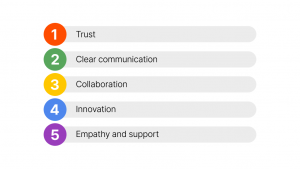Great research makes great writing – no matter how perfect your writing skills may be, without the necessary research skills, the paper you write is nothing other than your imagination. That’s understandable. Research itself can be overwhelming. Whether it’s online or offline, millions of resources in which we can obtain information exist, and yet it’s difficult to depict where and how we can extract it. No worries – improving your research skills helps you build a solid foundation for your project, and further provide quality information throughout your writing. If you’re looking to improve your research, read along.
1. Begin with Broad Topics.
Most of the time, we confront papers where we have little to no prior knowledge regarding the topic. Clueless and hesitant, we find ourselves looping circles – struggling to decide where to begin. The easiest approach in beginning your research is by tackling broad topics regarding your paper. With your question or thesis in hand, write down all the related subjects that first come in mind.
Start building that relationship with your subject, so that you become familiar and comfortable with the context when conducting your research in the later stages.
2. Get to Know the Topic.
As you’re surfing through your broad research, you should be reading and consuming information. Remember, you’re at the stage of trying to get to know about the topic. Don’t be careful with selection yet. Read and Consume – Get used to the information, stay updated and start building the foundational knowledge required to structure your writing. Having to understand the basic information before you begin your detailed research also helps with recognizing what elements are important, and valuable for your research.
Sometimes we get busy. Build a habit of saving and managing research so that you won’t feel lost and waste precious time in the future. That way you’ll know which sources you found interesting, and can access them whenever you need.
3. Conduct Detailed Research.
Now that you’ve built the structural bones of the knowledge, transitioning to specific topics that align appropriately with your paper shouldn’t be too difficult. Start searching for resources that provide valuable information that answer your questions. Detailed research can range from anything between detailed insight regarding your topic, as well as numeric data or visual evidence that can prove to be useful for your project. Remember, the sources you choose to use are also important – which leads us to the next step.
4. Use Quality, Reliable Sources.
It’s crucial to keep this in mind – research is used to provide persuasiveness in your writing. You need factual information that provides evidence for your statements, so that you can backup your assertions with reliable sources, to make your paper credible and convincing. In that sense, it’s absolutely essential that you utilize quality and reliable sources so that whoever is reading your paper is fully convinced about whatever statement you’re making.
Finding the appropriate sources is a valuable skill in becoming a great researcher. There are great tools out there, including Google Scholar, or the library (both online and offline) provided by your school. But it’s also important to recognize what makes the specific source ‘appropriate’ for the context of information. If it’s definition, you may refer to the dictionary. If it’s for an argument proving that there is a need for something out there, you could provide a first-hand or second-hand survey, with charts and numeric evidence.
You can conduct a “Source Evaluation” in order to check if your sources are suitable. The Harvard Library has a great article regarding this, which can be read here.
5. Don’t Rely on One Source.
Diversifying your research is an important element in making sure that the information you utilize is truly reliable. In fact, it’s an absolute necessity if you’re creating a paper that requires first-hand action or replication – whether it be a science experiment, business campaign for your company, or anything that needs confirmation and assertion of information so that nothing goes terribly wrong.
Many sources, especially the internet (which is the most used channel for extracting information), consist of biased, inaccurate and falsified information. Readers who assess your paper truly need valuable and credible information from multiple sources in order to reassure that whatever evidence you’re providing for your thesis is in fact, true.
6. Keep Your Research Organized.
If you’re following all the steps above, you may feel overwhelmed by both the quantity and diversity of your research sources. Regardless, it’s still a great sign that you’re fully utilizing your research. At times, the overflow of sources and information limits your ability to stay on track and structure your writing.
There are great tools out there that help you with this process, so that organizing your research is something that you shouldn’t weigh your concern over – Typed, Google’s Bookmark System, Zotero are the most popular among them all. You can read more about why it’s so important, as well as how you can achieve efficient organization of your research in our other articles.
Great Research Makes Great Writing.
Now that you’ve had a read about how you can enhance your research ability, writing your paper should be a breeze. Most of your papers or whatever you’re creating involve heavily around the information that you’ve gathered and learned. It’s a matter of how well you put it together – and that’s where your writing skills come in.
Nonetheless, if you’re following the steps mentioned within this blog post, you’ll have an easier time in overcoming the initial barriers of writing a paper. Research integration will be a lot more effective in your creations – which is the key quality that makes a great, persuasive piece of writing.



